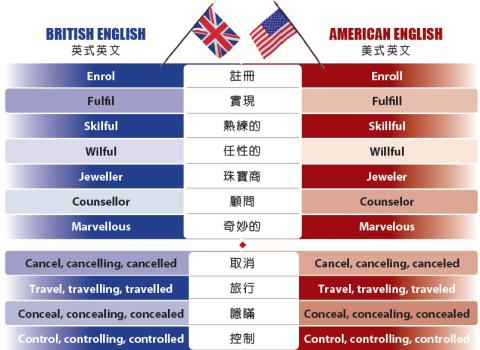There are certain spelling rules and conventions governing the doubling of the letter “l” in certain words in English, with differences between American and British English.
First of all, there are certain words that take a double “l” in American spelling that have a single “l” in British English. These include the verbs enroll, fulfill, instill, install and distill, whose British English variants are enrol, fulfil, instil, install and distil; and the adjectives skillful and willful, in which the double “l” of the root is dropped in British English, giving us skilful and wilful.
Bucking this trend are certain nouns and adjectives in US English that favor a single “l,” whereas British English prefers a double “l.” Thus we have jeweler, counselor, woolen and marvelous in American English, compared to jeweller, counsellor, woollen and marvellous in British English.

Finally, there are rules for adding -ed and -ing endings to verbs of more than one syllable ending in “l”, such as cancel, travel, retail, annul, level, conceal, quarrel, libel, control, overhaul and patrol.
In American usage, the final “l” is not doubled when the stress falls on the first syllable. This gives us canceled, traveling and libeling in American English, but cancelled, travelling and libelling in British English.
Verbs such as annul, control and patrol do not have the stress on the first syllable, so the “l” is doubled in both American and British English, giving us annulled, controlled and patrolled.
With these rules, in British English the “l” is always doubled.There is one important exception to this, however: when the vowel preceding the “l” ending is a diphthong — such as ea, ai and au — the “l” is not doubled, irrespective of where the stress falls. So, with conceal, retail and overhaul, the “l” is not doubled in either American or British English.
(Paul Cooper, Taipei Times)
有些英文單字,其中的「l」是否要重複一次而拼成「ll」,取決於特定拼寫規則及慣例,這在美式及英式英文中也有所不同。
首先,某些字裡的「l」,美式的拼法為「ll」,英式則是只有一個「l」,例如動詞「enroll」(註冊)、「fulfill」(實現)、「instill」(注入)、「install」(安裝)和「distill」(提取);這些字在英式英文則是拼為「enrol」、「fulfil」、「instil」、「install」和「distil」。形容詞「skillful」(熟練的)及「willful」(任性的),其英式拼法是將字根中的「ll」省略為「l」,而為「skilful」及「wilful」。
有的字反其道而行,例如某些名詞和形容詞的美式拼法傾向用單個「l」,在英式英文則偏向用「ll」。因此,美式英文的「jeweler」(珠寶商)、「counselor」(顧問)、「woolen」(羊毛)和「marvelous」(奇妙的),在英式英文是拼為「jeweller」、「counsellor」、「woollen」和「marvellous」。
最後,以字母「l」結尾、有多個音節的動詞,其後若要加上字尾「ed」或「ing」,也有特定規則,例如「cancel」(取消)、「travel」(旅行)、「retail」(零售)、「annul」(廢除)、「level」(弄平)、「conceal」(隱瞞)、「quarrel」(爭吵)、「libel」(誹謗)、「control」(控制)、「overhaul」(徹底檢修)和「patrol」(巡邏)等字。
在美式用法中,這些以「l」結尾的字若重音在第一音節,字尾的「l」就不會重複。因此美式的「canceled」、「traveling」、「libeling」等字,不同於英式拼法的「cancelled」、「travelling」及「libelling」。
動詞「annul」、「control」 及「patrol」的重音都不是在第一音節,因此加字尾「ed」與「ing」時,其美式與英式之拼法相同,都要重複字尾的「l」而成「ll」,為「annulled」、「controlled」及「patrolled」。
在英式英文中,所有以「l」結尾的字,加字尾「ed」、「ing」時,一律重複為「ll」。上述規則有一重要的例外:以「l」結尾的字,若「l」之前是雙母音(例如「ea」、「ai」和「au」),便不須重複「l」,無論該字重音在哪個音節。因此,「conceal」、「retail」、「overhaul」等字,字尾的「l」在美式及英式英文中都不會重複。
(台北時報林俐凱譯)

Have you ever wondered why “Manila envelopes” carry that name? The answer lies in a plant native to the Philippines. Though a fruit-producing plant, abaca is most valued for its leaf stalks, which are __1__ to extract fibers known as “Manila hemp.” These fibers are known for their strength and resistance to saltwater. Because of its __2__ in sea environments, Manila hemp has long been used to make Manila rope, a staple in the sailing and maritime industries for centuries. It withstands harsh ocean conditions without its flexibility being __3__. Manila rope doesn’t break down easily when exposed to

A: In addition to boyband Energy’s concerts, Taiwan’s first major male dance revue has attracted attention. B: Several South Korean male dance revues and Australia’s Thunder from Down Under often tour Taiwan. Now Taiwan’s first all-male revue has finally appeared. A: According to the Liberty Times, Muscle High: A Male Dance Revue from Taiwan, featuring 13 hunks, opened last month and will run until Sept. 14. B: The rise of “hunk fever” in recent years has even caused a trend of working out in Asia. A: Let’s go to the Taipei Music Center’s Sub Livehouse for the show. A:

A: Any fun events happening this weekend? B: Boyband Energy’s concerts and Taiwan’s first major male dance revue have both sparked anticipation recently. A: Energy staged a comeback last year — 15 years after they disbanded — and they’re now more popular than ever. B: Their megahit “Friday Night” even won Song of the Year at the Golden Melody Awards. A: To pay tribute to the Queen of Pop Madonna, they added her choreography of 16 continuous jump squats to their music video, prompting a “16-squat challenge” that went viral across Taiwan. Do you wanna try it out? A:

In a major step to combat carbon emissions, Norway’s pioneering “Northern Lights project” is set to expand its carbon capture and storage (CCS) capabilities. Backed by energy giants and the Norwegian government, this collaborative project is working to increase its annual carbon storage capacity from 1.5 million to over five million tons. Northern Lights focuses on capturing CO2 emissions from industrial sources across Europe and securely storing them underground. Captured CO2 will be liquefied and transported by ship to the storage facility located off the coast of Norway. It will be injected through pipes into geological formations about 2,600m below the